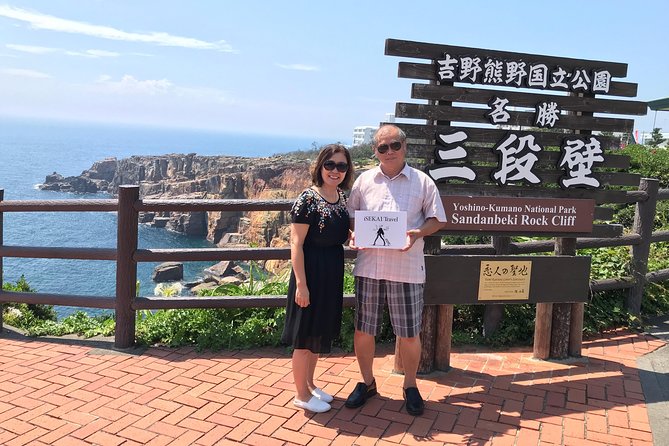While some may think that vegetarian cooking lacks excitement or flavor, Shojin Ryori: Buddhist Vegetarian Cooking Experience proves otherwise.
This captivating culinary practice, deeply rooted in spiritual beliefs, offers a unique way to explore the world of vegetarian cuisine. Originating in Japan, Shojin Ryori emphasizes simplicity, balance, and mindfulness in its dishes. Contrary to popular belief, this cooking style showcases the natural flavors and textures of plant-based ingredients such as vegetables, tofu, and grains.
By participating in this cooking experience, one not only learns the art of preparing delicious meals but also gains insight into the philosophy and principles behind this ancient practice. Shojin Ryori is a remarkable opportunity to explore the rich cultural heritage of Japan and discover the harmonious blend of flavors, aesthetics, and spirituality that make this culinary experience truly extraordinary.
Great News! You can reserve your spot for free with Viator. You can easliy cancel any time up to 1 day before without paying anything.
Quick Takeaways
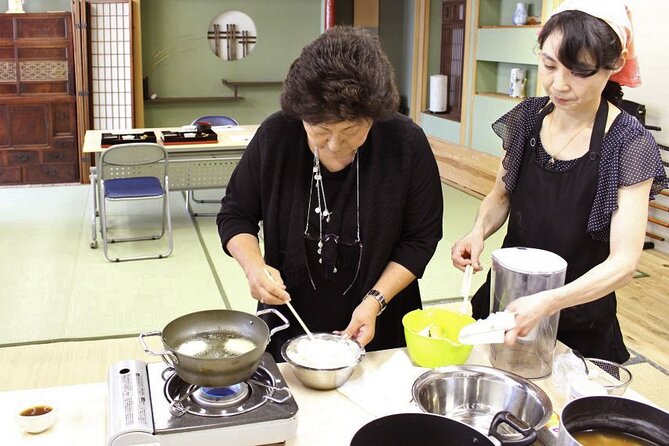
- Shojin Ryori promotes a healthy lifestyle and supports weight management.
- Shojin Ryori emphasizes mindfulness in eating and focuses on seasonal and local ingredients.
- Shojin Ryori avoids the use of animal products and prioritizes simplicity and natural flavors.
- Shojin Ryori enhances culinary diversity and creativity and supports sustainable and ethical food choices.
Not for you? Here's a few more great tours and experiences nearby.
Benefits of Shojin Ryori for Mind and Body
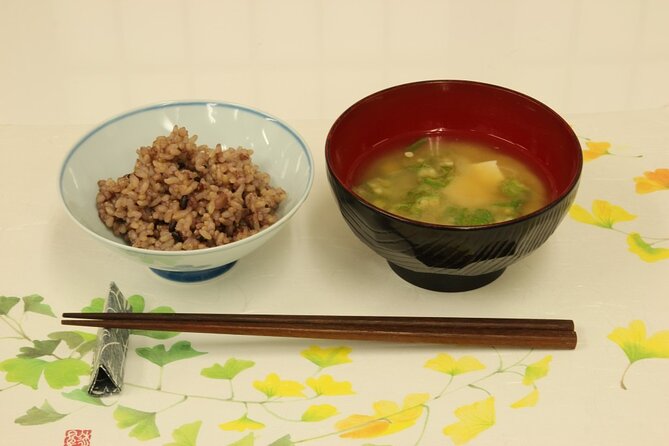
The benefits of Shojin Ryori for the mind and body are evident through its incorporation of wholesome vegetarian ingredients and mindful cooking techniques.
Shojin Ryori, a traditional Buddhist cuisine in Japan, not only nourishes the body but also promotes mental well-being.
The emphasis on fresh, seasonal vegetables, legumes, and grains provides a rich source of nutrients, leading to improved physical health.
Plus, the cooking process itself encourages mindfulness and focus, which can have a positive impact on mental health.
The act of preparing each ingredient with intention and gratitude fosters a sense of connection and balance within oneself.
Moreover, the simplicity and purity of Shojin Ryori allow for better digestion and absorption of nutrients, further contributing to overall physical well-being.
You can also read our reviews of more tours and experiences in Tokyo.
Origins and Philosophy of Shojin Ryori
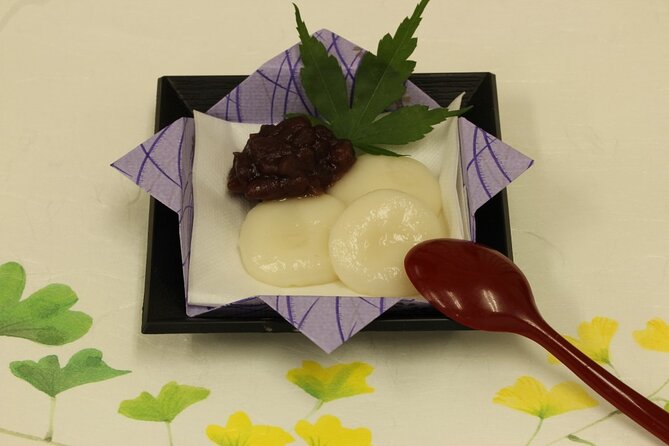
With its roots in Buddhist principles, Shojin Ryori originated in Japan as a mindful and vegetarian culinary tradition. The philosophy behind Shojin Ryori goes beyond just the act of cooking; it encompasses a way of life that promotes compassion, mindfulness, and balance.
One of the key aspects of Shojin Ryori is its emphasis on vegetarianism. By abstaining from the consumption of meat and fish, practitioners believe in preserving the sanctity of life and promoting a harmonious relationship with nature. This vegetarian approach not only aligns with Buddhist teachings but also brings numerous health benefits. Research has shown that a plant-based diet can lower the risk of chronic diseases, improve digestion, and increase overall vitality.
Plus, Shojin Ryori places great importance on mindfulness in cooking. Every step of the cooking process, from selecting ingredients to preparing and serving the food, is done with utmost attention and intention. This mindful approach not only enhances the flavor and quality of the dishes but also cultivates a sense of gratitude and connection with the food we eat.
Unique Ingredients Used in Shojin Ryori
Shojin Ryori incorporates a variety of unique ingredients to create flavorful and nourishing vegetarian dishes.
One of the key ingredients used in Shojin Ryori is konnyaku, a jelly-like substance made from the root of the konjac plant. Konnyaku is low in calories and high in dietary fiber, making it a great addition to the vegetarian diet.
Another unique ingredient is yuba, which is the skin that forms on the surface of heated soy milk. Yuba is rich in protein and contains essential amino acids, making it a nutritious ingredient.
Seaweed, such as nori and wakame, is also commonly used in Shojin Ryori. Seaweed is packed with vitamins and minerals, including iodine, calcium, and iron.
These unique ingredients not only add depth of flavor to the dishes but also provide numerous health benefits.
Step-by-Step Guide to Cooking Shojin Ryori Dishes
During the cooking experience of Shojin Ryori, you will be guided through a step-by-step process of preparing delicious and nourishing vegetarian dishes. Shojin Ryori, a traditional Buddhist cuisine, has a rich history and is known for its emphasis on simplicity and mindfulness. The benefits of vegetarianism are also highlighted in this cooking style, as it promotes a healthier and more sustainable lifestyle.
The first step in cooking Shojin Ryori dishes involves gathering fresh and seasonal ingredients, which are believed to be essential for a balanced meal. Participants will then learn how to prepare these ingredients by practicing various cooking techniques such as boiling, steaming, and simmering. Throughout the process, the importance of mindful cooking and gratitude towards the ingredients is emphasized, reflecting the Buddhist principles of compassion and non-violence.
Traditional Techniques and Cooking Methods
Participants in the Shojin Ryori cooking experience are taught traditional techniques and cooking methods, skillfully incorporating the principles of simplicity and mindfulness. These techniques have been passed down through generations and are an integral part of the Buddhist cuisine.
The focus on mindfulness in Shojin Ryori cooking not only enhances the dining experience but also brings numerous benefits. By being fully present in the cooking process, you can cultivate a sense of calm and appreciation for the ingredients they’re working with. This mindfulness extends to the sustainable cooking practices that are employed, such as minimizing food waste and utilizing seasonal ingredients. These practices not only promote a healthier planet but also contribute to the overall harmony and balance of the dish.
Through the traditional techniques and cooking methods taught in the Shojin Ryori cooking experience, participants can embrace the benefits of mindfulness and sustainable cooking practices in their own culinary journeys.
- Things To Do In Tokyo In November
- Things To Do In Tokyo In March 2024: Tokyo’s Best March Events
- Things To Do In April In Tokyo 2024: Tokyo’s Best April Events
- Things To Do In Tokyo In December 2023: Tokyo’s Best December Events
- Tokyo’s Weather And Seasons: A Guide For The Perfect Visit
- Tokyo Midtown Cherry Blossom Season
Exploring the Cultural Significance of Shojin Ryori
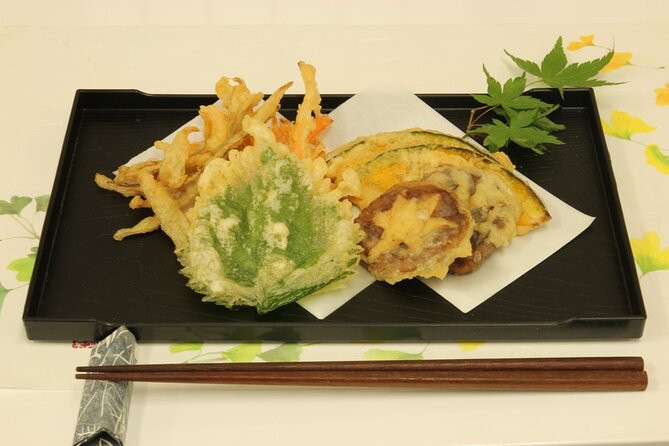
The cultural significance of Shojin Ryori can be explored through its unique blend of Buddhist principles and traditional Japanese cuisine. Shojin Ryori isn’t just about the food itself, but also encompasses cultural practices and beliefs that have been passed down through generations.
In Buddhist temples, Shojin Ryori is prepared and served as a form of spiritual practice, reflecting the principles of mindfulness, simplicity, and gratitude. The act of cooking and eating Shojin Ryori is considered a meditative process, where you can cultivate a deeper connection with themselves and the world around them.
Plus, Shojin Ryori offers numerous health benefits, as it’s primarily plant-based and focuses on using fresh, seasonal ingredients. This vegetarian diet not only nourishes the body, but also promotes balance, harmony, and overall well-being.
Tips for Incorporating Shojin Ryori Into Your Daily Routine
To incorporate Shojin Ryori into their daily routine, you can start by incorporating a plant-based meal into their diet. This not only aligns with the core principles of Shojin Ryori, but also introduces individuals to the flavors and techniques of this traditional Buddhist cuisine.
Here are four tips for incorporating Shojin Ryori into your daily routine:
- Experiment with new ingredients: Shojin Ryori emphasizes the use of seasonal and locally sourced ingredients. Incorporate a variety of vegetables, grains, and legumes into your meals to create diverse and nutritious dishes.
- Simplify your cooking process: Shojin Ryori focuses on simple cooking methods that preserve the natural flavors of the ingredients. Try steaming, boiling, or lightly stir-frying your vegetables to maintain their freshness and nutritional value.
- Practice mindfulness while eating: Shojin Ryori encourages mindful eating, where individuals savor each bite and appreciate the nourishment provided by the food. Take time to chew your food thoroughly and focus on the flavors and textures.
- Prioritize balance and harmony: Shojin Ryori emphasizes the balance of flavors, colors, and textures in each meal. Strive to create well-balanced meals that include a variety of tastes, such as sweet, sour, salty, and bitter, to ensure a satisfying and nutritious dining experience.
Incorporating Shojin Ryori into modern cuisine not only introduces individuals to the health benefits of plant-based eating but also encourages a mindful and balanced approach to food.
Recommended Shojin Ryori Recipes and Resources
One popular resource for Shojin Ryori recipes is a cookbook that features a collection of traditional Buddhist vegetarian dishes. This cookbook provides detailed instructions and ingredients for preparing a variety of Shojin Ryori meals, allowing individuals to recreate these delicious and healthy dishes in their own homes.
Some recommended Shojin Ryori cookbooks include ‘The Enlightened Kitchen: Fresh Vegetable Dishes from the Temples of Japan’ by Mari Fujii and ‘The Buddhist Chef: 100 Simple, Feel-Good Vegan Recipes’ by Jean-Philippe Cyr. These cookbooks not only offer recipes, but also provide insights into the history and philosophy behind Shojin Ryori.
Plus, for those who prefer to experience Shojin Ryori in a restaurant setting, there are many popular Shojin Ryori restaurants in Japan, such as the renowned Kanga-an in Kyoto or the peaceful Aoyama Shojin in Tokyo. These restaurants offer an authentic and immersive dining experience, allowing patrons to savor the flavors of Shojin Ryori prepared by skilled chefs.
Frequently Asked Questions
What Is the Price for the Shojin Ryori: Buddhist Vegetarian Cooking Experience?
The price for the Shojin Ryori: Buddhist Vegetarian Cooking Experience varies based on group size. It offers an opportunity to learn about traditional Buddhist vegetarian meals and the benefits of practicing Shojin Ryori in daily life.
Where Is the Meeting Point for the Cooking Experience?
The meeting point for the cooking experience is at the main entrance of the Kikai Shinko Kaikan building on the 1st floor. If the instructor is not there, visitors can go to True Japan Tour on the B1 floor.
Is the Cooking Experience Wheelchair Accessible?
Yes, the cooking experience is wheelchair accessible. They have accessible facilities and wheelchair-friendly options available. People with mobility challenges can participate in the activity without any issues.
Can I Cancel the Cooking Experience and Receive a Refund?
Yes, you can cancel the cooking experience and receive a full refund. The cancellation policy allows for cancellations up to 24 hours in advance of the experience. Simply contact the provider to initiate the refund process.
How Many Travelers Can Participate in the Cooking Experience?
The cooking experience can accommodate a maximum of 8 travelers. It is recommended to make a reservation in advance due to limited group size. Please refer to the reservation policy for cancellation and refund details.
The Sum Up
To sum it up, Shojin Ryori offers not only a delicious vegetarian culinary experience but also a window into the rich cultural heritage and spiritual beliefs of Japan.
By embracing simplicity, balance, and mindfulness, this unique cooking style provides numerous benefits for both the mind and body.
Whether you’re a vegetarian, a food enthusiast, or simply curious about exploring new culinary traditions, Shojin Ryori is a remarkable opportunity to discover the harmonious blend of flavors, aesthetics, and spirituality that make this culinary experience truly special.
More Cooking Classes in Tokyo
- Okonomiyaki Cooking,Japanese Sake Free Flowing Experience
- 2-Hour Japanese Lunch Cooking Guided Class in Kagurazaka
- Private Market Tour and Traditional Japanese Cooking Class in Asakusa
- Private Traditional Japanese Cooking Class in Tokyo
- Japanese Traditional Cooking Class
- Traditional and Ordinary Japanese Udon Cooking Class in Asakusa, Tokyo [The Only Udon Artist in the
More Tour Reviews in Tokyo
- Tokyo Airport Transfers: Tokyo City to Tokyo-Narita Airport NRT in Business Car
- Private & Custom TOKYO Day Tour Toyota COMMUTER (Max 13 Pax)
- Private Transfer From Tokyo Port to Tokyo Haneda Int Airport(Hnd)
- Shinjuku Golden-Gai and Kabuki-Cho Bar Hopping With Master Guide
- SHIMOKITAZAWA Local Walking Tour
- Small Group Iaido Class in Tokyo
Not for you? Here's more nearby things to do in Tokyo we have reviewed
- Tokyo Airport Transfers: Tokyo City to Tokyo-Narita Airport NRT in Business Car
- Private & Custom TOKYO Day Tour Toyota COMMUTER (Max 13 Pax)
- Private Transfer From Tokyo Port to Tokyo Haneda Int Airport(Hnd)
- Shinjuku Golden-Gai and Kabuki-Cho Bar Hopping With Master Guide
- Small Group Iaido Class in Tokyo
- Private Casual Photoshoot Tour in Tokyo
- Private Transfer From Tokyo City Hotels to Sendai Cruise Port
- Private Transfer From Tokyo Narita Int Airport(Nrt) to Tokyo Port
- Okonomiyaki Cooking,Japanese Sake Free Flowing Experience
- Mt. Fuji Majestic Tours : Shinjuku to Arakurayama and Beyond
- Private Transfer From Tokyo Cruise Port to Tokyo Hotels
- Private Transfer From Nagasaki Hotels to Nagasaki Cruise Port

